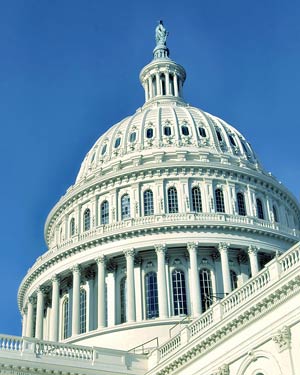House Committee to Take Action on Autism Bill
May 28, 2014
Kim E. Musheno
Director of Public Policy
301-588-8252
[email protected]

|
Today, the House Energy and Commerce Subcommittee on Health will markup the "Combating Autism Reauthorization Act of 2014" (H.R. 4631). Since its enactment, the law has impacted millions of individuals with autism and other developmental disabilities and their families. Congress must reauthorize the Combating Autism Act before September 30, when most of its provisions will expire.
This bipartisan bill extends the current law for five years and makes minor changes to strengthen coordination and oversight of federal autism activities. It also authorizes a study and report with policy recommendations to address youth with Autism Spectrum Disorders who need supports and services to transition from school to work or postsecondary education.
The prevalence of autism is growing. According to the Centers for Disease Control and Prevention, autism now affects approximately one in every 68 children. The Combating Autism Act has shown significant progress in identifying possible causes and in increasing the capacity of professionals to screen, diagnose, treat and support individuals with Autism Spectrum Disorders (ASD). However, substantial gaps remain, and congressional action to reauthorize the Combating Autism Reauthorization Act is critical to sustain the work begun under this law.
"One of the greatest needs identified during the development of the legislation is the lack of trained professionals to provide identification, diagnostic and clinical services for children with ASD and other developmental disabilities," said Leslie Cohen, AUCD President and Director of the Sonoran University Center for Excellence in Developmental Disabilities at the University of Arizona. "The law provided for the expansion of existing members of the AUCD network, the Leadership Education in Neurodevelopmental and Related Disabilities (LEND) programs, and other networks, such as the Developmental Behavioral Pediatrics (DBP) interdisciplinary training programs, to focus on training health professionals in the use of valid, reliable screening and diagnostic tools, and in the provision of evidence-based interventions for children with ASD. These training efforts are effectively reducing barriers to screening and diagnosis by increasing health professional capacity and awareness about ASD among parents and early childhood providers."
AUCD appreciates the leadership of the bill's sponsors, Representatives Chris Smith (R-NJ) and Mike Doyle (D-PA), co-chairs of the Bipartisan Coalition for Autism Research and Education. They were also the co-sponsors of the original bill and the bill to reauthorize the law in 2011.
Senators Robert Menendez (D-NJ) and Michael Enzi (R-WY) are expected to introduce a companion bill soon.
AUCD urges the House and the Senate to work in a bicameral, bipartisan fashion to move this bill quickly and not let this law expire.
About AUCD
AUCD is a national network of 67 University Centers for Excellence in Developmental Disabilities (UCEDDs); 43 Leadership Education in Neurodevelopmental and Related Disabilities (LEND) programs; and 15 Intellectual and Developmental Disabilities Research Centers (IDDRCs). As the prevalence of autism has risen, University Centers have initiated many activities to help meet the growing needs of children, adults, and families. Together, these programs have a national impact through direct services, the development of new professionals, and the application of new knowledge generated from research. For information about AUCD Interdisciplinary Technical Assistance Center on Autism and Developmental Disabilities, visit ITAC. For a national directory of Centers, see AUCD's website at www.aucd.org.
For more information on the Combating Autism Act, see "Report to Congress on Activities Related to Autism Spectrum Disorders and Other Developmental Disabilities Under the Combating Autism Act of 2006 and Combating Autism Reauthorization Act of 2011 (FY 2010-FY 2012)."
###







